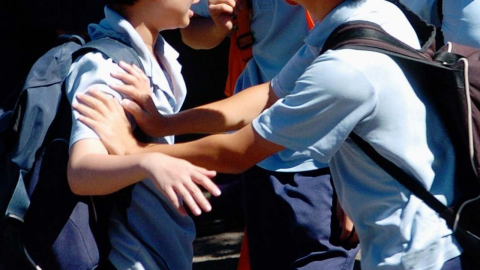
More than 600 kindergarten students were suspended from NSW primary schools last year, raising concerns small children are being sent home as punishment for undiagnosed disorders such as autism or ADHD.
Figures from the NSW Department of Education show the number of kindy students suspended rose from 398 in 2014 to 435 in 2016, then jumped to 514 in 2017. Last year, the figure reached 626.
The department is reviewing its suspension and expulsion policy after revelations students with disabilities are over-represented in suspension figures.
Louise Kuchel from Parents for ADHD Advocacy Australia said many students were arriving in kindergarten with undiagnosed or newly-diagnosed conditions such as ADHD, autism, or anxiety, which affected their behaviour. "It's really a concern that these are little tiny kids," she said.
"[When] the principals go down the path of suspending the child, they are supposed to show that they have been violent, that they were going to hurt them or harm the teacher, yet they are just five years old. It doesn't make sense."
But disability expert Linda Graham from the Queensland University of Technology said the figures showed NSW was doing a better job on suspensions than Queensland.
"I think that no kindy kid should ever be suspended, because they don't understand what it means, but those figures are considerably less than Queensland," she said. "In 2017, there were 1067 prep kids suspended in Queensland.
"It's not good that 626 four and five-year-olds are being suspended. It's terrible that that is happening, however NSW is clearly doing something better than Queensland."
Labor MP Courtney Houssos, a member of the upper house education committee, which called for the figures, urged Education Minister Sarah Mitchell to investigate.
"Suspensions should only ever be used as a last resort and it's deeply concerning that more than 600 children who have just started school have already been suspended," she said.
One mother, who spoke on the condition of anonymity, said her son was suspended five times in kindergarten. He is now in year 2 and has been suspended a total of 11 times, she said.
"He gets quite dysregulated because of ADHD, he will push over tables - he goes into fight or flight." she said.
"His teachers just don't get the right training, they don't understand it's a disability."
Labor's education spokesman Prue Car said "something is drastically wrong if 600 kindergarten children are being suspended" in a year.
The figures apply to public schools. Parliament cannot compel Catholic and independent schools to reveal their suspension figures.
Earlier this month, the Herald revealed students with a disability made up 20 per cent of the school population but more than 40 per cent of those suspended, and children in years one and two of primary school made up more than six per cent of all students sent home from school for disciplinary reasons.
The NSW Department of Education policy statement says suspension is not designed to be punitive, but rather to give the school, student and parents time to put strategies in place to help avoid a similar situation in the future.
Four per cent of NSW public school students, or 32,300 children, received short-term suspensions last year, with more than 9000 of them in primary school. About 1.5 per cent of all students were given long-term suspensions, lasting for between four and 20 days.
"The rate of suspension for our kindergarten students is concerning and the department is working with internal and external stakeholders on an independent review to look at how we can better support students, including in stage one. The review will be completed in 2020," a spokesman for NSW Department of Education said.
"The current suspension policy provides guidance on suspension and expulsion of school students from NSW government schools.
"The policy provides guidance on both long and short suspensions for specific behaviours," he said.